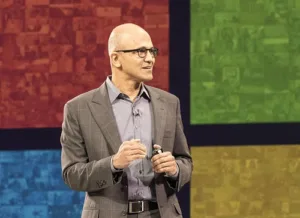Following the announcement of job losses in Microsoft’s phone business (Microsoft to Cut 7,500 Jobs), ZDNet‘s Mary Jo Foley sat down with CEO Satya Nadella at the company’s Worldwide Partner Conference.
Nadella’s comments about Windows on mobile should serve to reassure the company’s partners. Many industry watchers considered the latest round of cuts as a move towards abandoning the smartphone market; however, said Nadella, that is not the case.
Image credit: ZDNet“Last week’s announcement was not about any change to our vision and strategy, but for sure it was a change to our operating approach… I’m not going to launch a phone a day. I’m going to focus on a few phones that actually grab share [and] that, in fact, showcase our uniqueness. When you have [a] three percent share of that [phone market], but you also have a billion desktops, you have Xbox, you have innovation in HoloLens; you have Band… It is the entirety of the device family. And I want to be able to think about our strategy, our innovation, and progress as one.
“If anything, the thing that I’m signaling most to the investors, to the employees is let’s stop this thing about trying to atomically dissect any one. They will all have a temporal current position and a future ambition. But it is one thing that we need to move on”.
Elaborating, Nadella said that the job cuts were because he no longer wants Microsoft to be manufacturing the majority of Windows phones. Instead, the company would rather rely on OEM partners – although he did add, “If no OEM stands up to build Windows devices, we’ll build them”.
Foley asked why a developer would want to make apps for Windows Phone, if there are going to be fewer devices running the OS? Microsoft makes 95% of Windows Phones today. If the company steps back from production, doesn’t that weaken the universal apps play (‘universal apps’ refers to the ability write an app once then easily be able to port it to any other Windows device)?
“The reason why anybody would want to write universal apps is not because of our three percent share in phones”, Nadella acknowledged. “It’s because a billion consumers are going to have a Start Menu, which is going to have your app… If anything, the free upgrade for Windows 10 is meant to improve our phone position. That is the reason why I made that decision. If somebody wants to know whether I’m committed to Windows Phone, they should think about what I just did with the free upgrade to Windows, rather than — hey, I’m making four more phone models of value smartphones”.
Analyst Comment
Nadella’s comments should reassure the many people worried about the future of Windows Phone after last week’s cuts – I was one of them. However, Microsoft is still taking a big risk. As easy as it will be for developers to write apps for multiple Windows devices, they must first want to work with Windows. If companies still don’t see the value in writing apps for Windows 10, then the phone will be dead.
The entire strategy revolves around getting the millions of Windows 7 and Windows 8 users to upgrade to Windows 10, and then using the Windows 10 store. It is a risk, but one that – if it pays off – could see Windows Phone resurge in a big way. (TA)

